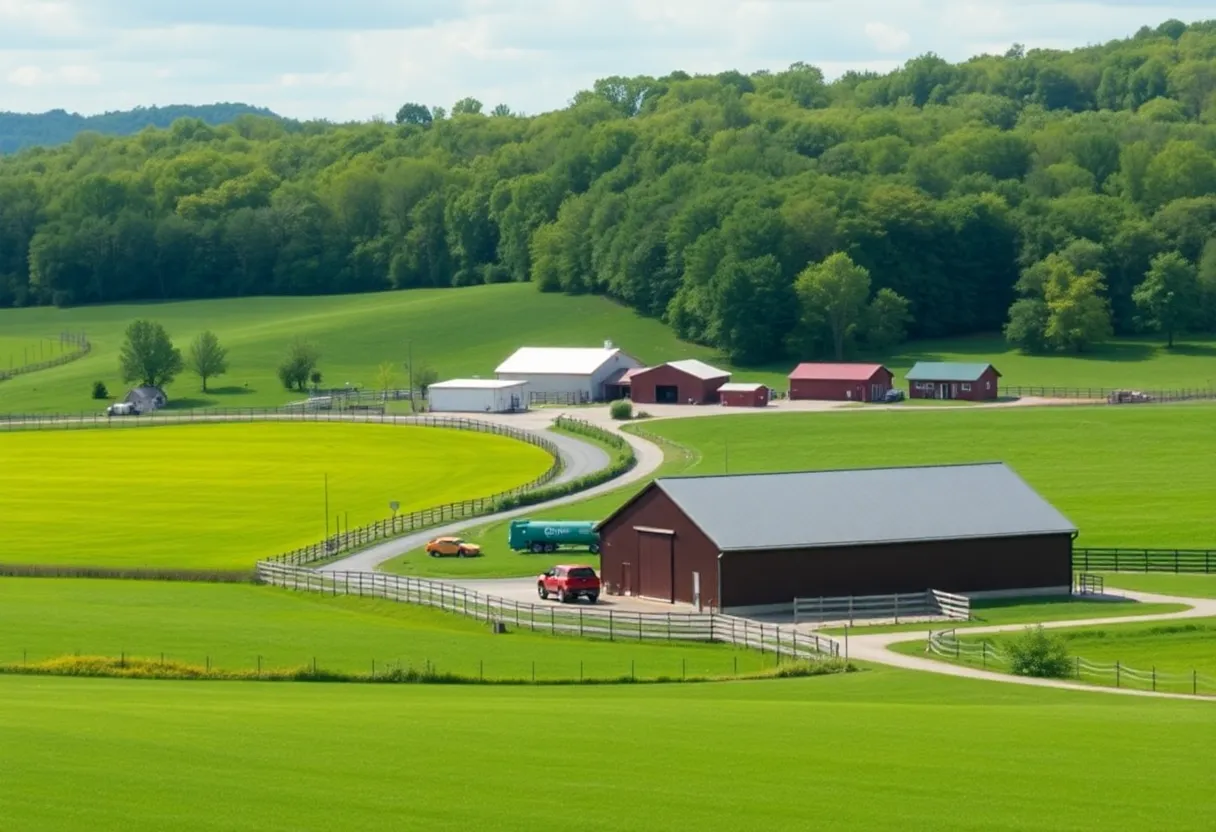News Summary
On April 14, 2025, Myerstown, Pennsylvania, became a hub for agricultural discussions as Secretary of Agriculture Brooke Rollins met with local farmers amidst current trade tensions. Prominent politicians joined to address concerns surrounding tariffs and the impact on the agricultural sector. Rollins defended recent tariff policies as a step towards better long-term trade agreements while local farmers voiced their worries about potential economic repercussions. The event underscored the vital conversations needed for the future of Pennsylvania’s agriculture amid ongoing challenges.
Myerstown Witnesses Agricultural Insights Amid Trade Tensions
On April 14, 2025, the town of Myerstown, Pennsylvania, became a focal point for discussions surrounding agriculture as U.S. Secretary of Agriculture Brooke Rollins visited Martin’s Family Farm. Accompanying her were notable figures, including Republican U.S. Senator Dave McCormick, U.S. Representative Glenn ‘GT’ Thompson, who chairs the House Agriculture Committee, and U.S. Representative Dan Meuser. The gathering was more than just a tour; it was a platform for farmers to voice their concerns and hopes for the agricultural landscape influenced by current trade issues.
Local Farmers Share Concerns
Hosting the event were the Copenhaver family, renowned owners of Talview Dairy Farm located in Lebanon County. Their farm provided the perfect backdrop for highlighting the pressing concerns of local farmers, particularly surrounding the tariffs that have introduced uncertainty into the agriculture sector. Brent Copenhaver expressed his worries about how these tariffs would affect not just their farm but the broader Pennsylvanian agriculture industry.
Defending Tariffs for Long-Term Gain
Despite the unease among local farmers, Rollins defended the tariffs put in place by the previous administration, emphasizing that these changes, although disruptive in the short-term, are aimed at paving the way for better trade agreements in the long run. Since these tariffs were announced, economic analysts have noted fluctuations in the stock market, leading to wider concerns of a potential recession. Rollins, however, remained optimistic, suggesting that any adverse effects on farmers would be temporary and that long-term benefits await.
Support for Farmers Amidst Challenges
Senator McCormick, while acknowledging the current market challenges, expressed confidence that the new trade agreements being negotiated would ultimately yield positive economic returns. Furthermore, during the previous presidential term, significant funds—totaling $25 billion—were allocated from the Commodity Credit Corporation to assist farmers impacted by trade disputes, particularly those involving China. This financial cushion is meant to reassure farmers that the administration stands ready to help if trade negotiations adversely affect their livelihoods.
State’s Concerns on Funding Cuts
While federal officials aim to tackle the issues at hand, voices from the state level raised alarms about potential funding cuts to essential programs. Pennsylvania Governor Josh Shapiro and Agriculture Secretary Russell Redding took issue with the USDA’s decision to cancel programs that facilitate funding for local food purchases. In response to these criticisms, Rollins dismissed claims regarding a lack of support for farmers and food banks, maintaining that resources are indeed available for those in need.
Discussions on Supplemental Nutrition Assistance Program
With a significant budget plan proposed by House Republicans suggesting a cut of $230 billion from the Department of Agriculture, many Democrats expressed concern over what this could mean for crucial support systems like the Supplemental Nutrition Assistance Program (SNAP). In light of these tensions, Thompson assured that cuts to SNAP benefits would not be on the table, reiterating the need for efficiency within the programs.
Labor Challenges and H2-A Visa Program
Addressing ongoing labor shortages within the agricultural sector, Rollins highlighted the critical importance of collaborative solutions between the Department of Labor and the agricultural community. Efforts are underway in Congress to reform the H2-A visa program, which is instrumental in bringing agricultural workers into the country to help with labor shortages.
Moving Forward with the Farm Bill
As the discussions unfolded at the event, confidence also emerged regarding the future of the Farm Bill. Thompson expressed optimistic anticipation for its passage in the near future. Local farmer Brent Copenhaver underscored the necessity of updating the Farm Bill, particularly to improve dairy margin coverage to reflect modern farming practices effectively.
The day in Myerstown served as an important reminder of the ongoing dialogues essential for the future of Pennsylvania agriculture. As local leaders, farmers, and federal officials continue their discussions, it’s clear that the agricultural sector remains resilient and committed to adapting to the changes ahead.
Deeper Dive: News & Info About This Topic
- Lancaster Farming: Bird Flu Response
- Wikipedia: Agriculture in the United States
- Republican Herald: Agriculture Policy Discussion
- Google Search: Agriculture Policy United States
- Lancaster Farming: USDA Funding for Agricultural Programs
- Google Scholar: USDA Funding Agriculture
- Republican Herald: Impact of Tariffs on Agriculture
- Encyclopedia Britannica: Tariff
- Lancaster Farming: Challenges Faced by Local Farmers
- Google News: Challenges Local Farmers







